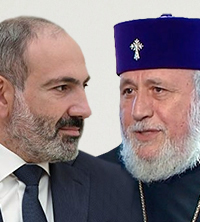
After a change of power in Armenia, there has been a period of uncertainty where there are more questions than answers. These questions are also numerous in regard to the future of civil society. Human rights activists, many members of religious organizations have participated in mass demonstrations and have expectations from the new government. The new prime minister has given many promises during the demonstrations and campaigns, and has already begun to abandon some of these promises. In this article, we are interested in the situation of religious freedom, whether we will see solution to the decades-long problems or the uncertain and distorted nature of the previous governments’ policies will be once again continued.
The religious theme has been exploited for many times after the change of power as well as during the December parliamentary election campaigns in Armenia. The former ruling Republican Party of Armenia (RPA) made one of the key pillars of its pre-election campaign the “traditional national values”, whose central idea was to protect the Armenian Apostolic Church from the dangers of “sects.” It is clear that RPA could not find another ideological basis because it had failed in all matters. They accused the new government of defending “sectarians.” In terms of content it was a hate propaganda campaign on religious grounds. On the other hand, the new prime minister has also been involved in this rhetoric and used the term “sectarian” to protect from such accusations. “I want to raise our loyalty to Christianity and the essence of our identity, to our faithfulness to the values of the Armenian Apostolic Church. I am a follower of the Armenian Apostolic Church myself, but I also speak out to our Catholic, Evangelical brothers. We must adhere to our Christian roots, we must reject totalitarian sects that deprive man of freedom and sovereignty.” This obviously contradicts the principle of separation between the church and the state. It is not the government’s job to provide qualifications to this or that organization. It is clear that this posture was the response of the Republican Party’s counter-campaign before the elections, but on the other hand, the prime minister, on another occasion, has shown an opposite approach.
Since May, a new movement under the slogan “New Armenia, New Catholicos” was launched inside the Armenian Apostolic Church aimed at dismissing the Catholicos on corruption charges and fraudulent struggle against “sectarians.” There were clashes between the two sides, but the law enforcement authorities and the government in general did not support any of the sides in that conflict. Prime Minister Pashinyan publicly stated that the church is separated from the state and he will not intervene in the conflict, which has been an unprecedented approach in Armenia.
These two examples show that the new government has not adopted a clear policy yet.